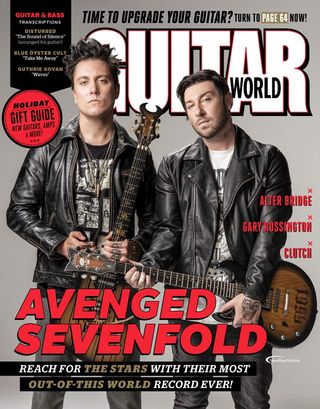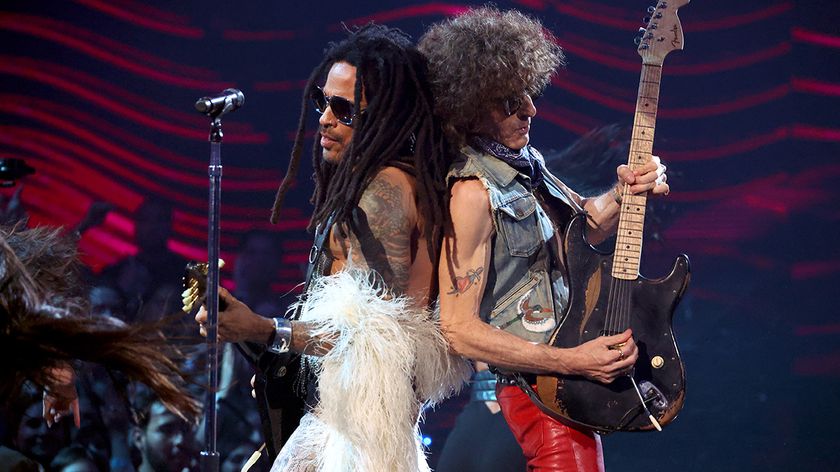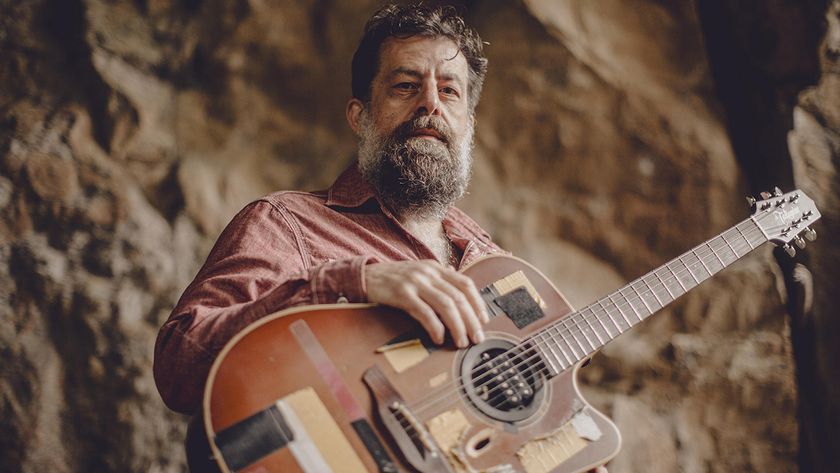Avenged Sevenfold's Synyster Gates and Zacky Vengeance Talk 'The Stage'

“My grandpa always said, getting old ain’t for pussies, and that is soooo true,” says a laughing Synyster Gates, co-guitarist in the hard rock force of nature known as Avenged Sevenfold.
“If you want to do things right, you have to dig deep for that inspiration.” At age 35, Gates is far from being an old fart, but after 15 years in one of metal’s most notorious party bands you wouldn’t blame him if he wanted to slow down, eat popcorn and binge-watch The Eric Andre Show. But that was not to be. Instead, he and his band pulled up their britches and recorded their most surprising and ambitious album of their career.
The Stage is a 73-minute extravaganza stuffed with thought-provoking ideas about artificial intelligence and mammoth musical productions like the 16-minute “Exist.” Inspired by the heady writings of astrophysicist Carl Sagan and inventor Ray Kurzweil, the band’s seventh studio album took over a year to write and record, and sounds like it. But as strong and assured as the finished product sounds, its beginnings were as sluggish as a creaky 1984 Macintosh 128K computer.
“For months we were asking each other whether we were ready to write a record, and the answer kept coming up negative,” says Gates. “I sat down a couple times and tried to write some lyrics, but my heart wasn’t into it. I knew I was just recycling old ideas, and the other guys were having the same experience.”
The truth was, the band members—vocalist M. Shadows, guitarist Zacky Vengeance, bassist Johnny Christ and new drummer Brooks Wakerman—were no longer the same kids that wrote City of Evil in 2005. Some of them had children of their own, and they weren’t drinking and partying together every night like in the bad ol’ days. Their lifestyles had radically changed, but instead of regressing, they decided to embrace their newfound maturity and figure out new ways to work together.
“It started with just hanging, having lunch together, drinking a little coffee and being adults,” says Gates. “We discovered that everyone had interesting new experiences and influences to share. Our singer, Matt, was reading Stephen Hawking and other physics-related books, and I was reading entrepreneurial books and we all started discussing the new technologies that were taking over the world, from 3-D printing to space travel.
“These conversations starting leading us to think of how we could portray these things in a musical way. Eventually we landed on the topic of artificial intelligence and its many ramifications. When we began considering things that never influenced us before, it gave us some room to reinvent ourselves and ideas just started pouring out.
Get The Pick Newsletter
All the latest guitar news, interviews, lessons, reviews, deals and more, direct to your inbox!
“There was only one rule. We said if we were going to write about artificial intelligence, we couldn’t make any reference to the Terminator movies,” he says with a laugh. “And that was hard, because it’s literally in our top five favorite fucking movies since we were kids, but we knew we had to stay away from that. No one would take us seriously if we did.” Terminator or no Terminator, guitar nerds will undoubtedly take this album very seriously.
Over the years, Gates and co-guitarist Zacky Vengeance have gradually evolved into one of the most interesting two-guitar teams in rock. While Gates still plays most of the leads and Vengeance is primarily the rhythm guy, most of the quality time on the album spent weaving in and out of each other, with sophisticated chord voicings and supportive harmony lines that sound more orchestral in nature than your typical power chord/lead guitar fare.
Not since Brian May’s groundbreaking work in Queen have guitars been called on to do so many things. On their adventurous eight-minute title track, “The Stage,” the duo shift effortlessly between aggressive thrash rhythms to shimmering chorus textures that melt into string-like legato melodies that support and lift the chorus before landing on a series of harmony leads straight from the Eagles’ “Hotel California” playbook. And just when you think the song is finished, a gentle coda ends on the wistful sigh of two nylon string guitars.
To their credit, none of these shifts call much attention to themselves. They flow naturally, serving to highlight the vocal melodies as the parts drive the song in logical and satisfying ways. It’s only afterward, when you think about what has happened, that you realize how clever the journey was. How do they do it? Enter Synyster Gates and Zacky Vengeance.
Did you have any thoughts going in to this album in terms of your overall musical direction?
SYNYSTER GATES Not at first, but once we got into it and started having more adult conversations about the music it got pretty clear where we wanted to go. We eventually settled on a balance of some R&B and a truckload of guitar orchestration that we wanted to sound like Star Wars on metal steroids.
ZACKY VENGEANCE We wanted to basically flip the script from the last album and be ambitious on every level: the length of the songs, the subject matter, the guitar riffs and harmonies. The idea was to come up with creative guitar arrangements rather than just write killer riffs. Don’t get me wrong, I love coming up with riffs. Riffs are fantastic. But after 30, 40 years of heavy metal bands coming up with great riffs, anything you do has the potential of being a rehash. Instead, we wanted to take our instruments and do something different, and make some new kind of noises.
I noticed that there are a lot of dynamics in the recording, which flies in the face of the current trend where everything is mastered to sound loud and in-your-face.
VENGEANCE Yeah, absolutely. Most modern recordings are so loud and over-compressed that they exhaust the ear. I know that they're designed to push the volume levels, but in the process you lose nuance. I love listening to Led Zeppelin and classic rock albums from the Seventies. They’re just so brilliant because they breathe. The tendency in modern recording is to hit you with a solid wall of sound, and I think it keeps the listener out of the music rather than inviting them in.
Even on your most basic songs, there is a great deal of thought put into the arrangement and guitar orchestration. Can you take me through a couple songs and explain how they came together? Something like “The Stage” is good to talk about because, by your standards it has a pretty straight-forward chord progression, but the guitar keeps spinning variations over those chords and it has a lot of hallmarks of your style.
GATES We always spend a lot of time on the demo and writing process, really polishing arrangements and exploring different ideas and textures before we even go into the studio. It’s a good process because there have been times when a band member really believes in something the other four don’t, and it gives them time to paint a more vivid picture until everybody goes, “Oh wow, you really do have something going there, man. That’s pretty cool.”
As much as we wanted this album to be unbelievably different, we wanted “The Stage” to be a bit of a throwback song, we wanted people to see some of our DNA in it.
What impressed me about “The Stage” was the chord movement. In the verse you move a half step from E minor to Eb Major, and in the chorus you move a half step from E minor to F major. In both cases it’s a small chromatic shift but the effect is huge. The verse is dark and the chorus is uplifting.
VENGEANCE That’s something we started playing around with on our last album, Hail to the King. We got that from listening to the chord progressions of [classical composer] Gustav Holst. On his piece The Planets [a seven-movement orchestral suite], he often floats around the same notes, but makes these slight variations that have a lot of impact. On this album we explored those kinds of chromatic chord progressions quite a bit. It sounds awesome, but trying to find the right melody that fits, or figuring out how to solo over something like that can be difficult, but it usually forces you to find something really fresh and different.
GATES Yeah, on the verse where it pivots between E minor and Eb major, the Eb works in two ways. If you think of the vocal melody as being in B major (the V chord of E minor), when we shift to the Eb major chord, you can use it as a major third to the B major scale or go to a G which is a major third to the Eb major. You get more bang for your buck. You get a weird ethereal sound or can get the traditional minor to fifth major. I can’t say we started off trying to do that, but knowing a little theory allows you to take advantage of something like that—the less apparent route.
What distinguishes you from many other metal bands is your full embrace of the minor chord. A lot of other bands tend to power chord on the minor chords, but you guys really use the minor third in your vocal melodies and guitar orchestration. I think most bands think it sounds sorta wimpy, but you exploit it for the drama.
VENGEANCE I know exactly what you're saying, and a lot of it comes from growing up on bands like Bad Religion, who were not afraid of minor keys. We were always attracted to bands that were melodic, but still maintained their edge. A lot of the minor chords start out as vocal melodies. Matt likes to go there, so the guitars tend to follow. It's a way of being melodic without being too sugary.
Another hallmark of your style is your distinctive use of harmony guitars. Sometimes you use them as lead lines like Iron Maiden or Metallica, but just as often you use them almost like string lines or background keyboard pads. You do both in “The Stage.”
VENGEANCE That’s a great way of looking at it. We absolutely use harmony guitars like strings. I think we sort of do it subconsciously. The entire chorus of “God Damn” sits on top of our harmony guitars that are arranged like strings, but another way of looking at it, we also use them to replace backing vocals.
One of our biggest pet peeves is listening to bands that use harmony guitars for the sake of it. If you can’t figure out how do something different than Maiden, UFO or even Boston, then what’s the point? Our natural tendency is to think in an orchestral way. You want those lines to support the vocals, and we’ve gotten much better at arranging them. In the past, I think our guitars were sometimes too busy and distracting. Although our fans loved it, I’m sure some people thought some of our playing was overkill, like, “Jesus, how much shit can they get in there?” The answer was a lot! We’ve gotten better at editing ourselves.
For the entire interview, check out the January 2017 issue of Guitar World on newsstands and the Guitar World Online Store.

A long time ago in a galaxy far, far away Brad was the editor of Guitar World from 1990 to 2015. Since his departure he has authored Eruption: Conversations with Eddie Van Halen, Light & Shade: Conversations with Jimmy Page and Play it Loud: An Epic History of the Style, Sound & Revolution of the Electric Guitar, which was the inspiration for the Play It Loud exhibition at the Metropolitan Museum of Art in New York City in 2019.

“The concept of the guitar duel at the end was just appalling”: Crossroads is an essential piece of '80s guitar lore, but not every guitar legend was a fan of the film

“Zal is really nobody’s guitar hero. Fans say he’s the most underrated player ever; many guitarists rate him amongst the best... but I’ve never heard anyone call him their ‘guitar hero’”: Billy Rankin on lessons learned from the legendary Zal Cleminson









